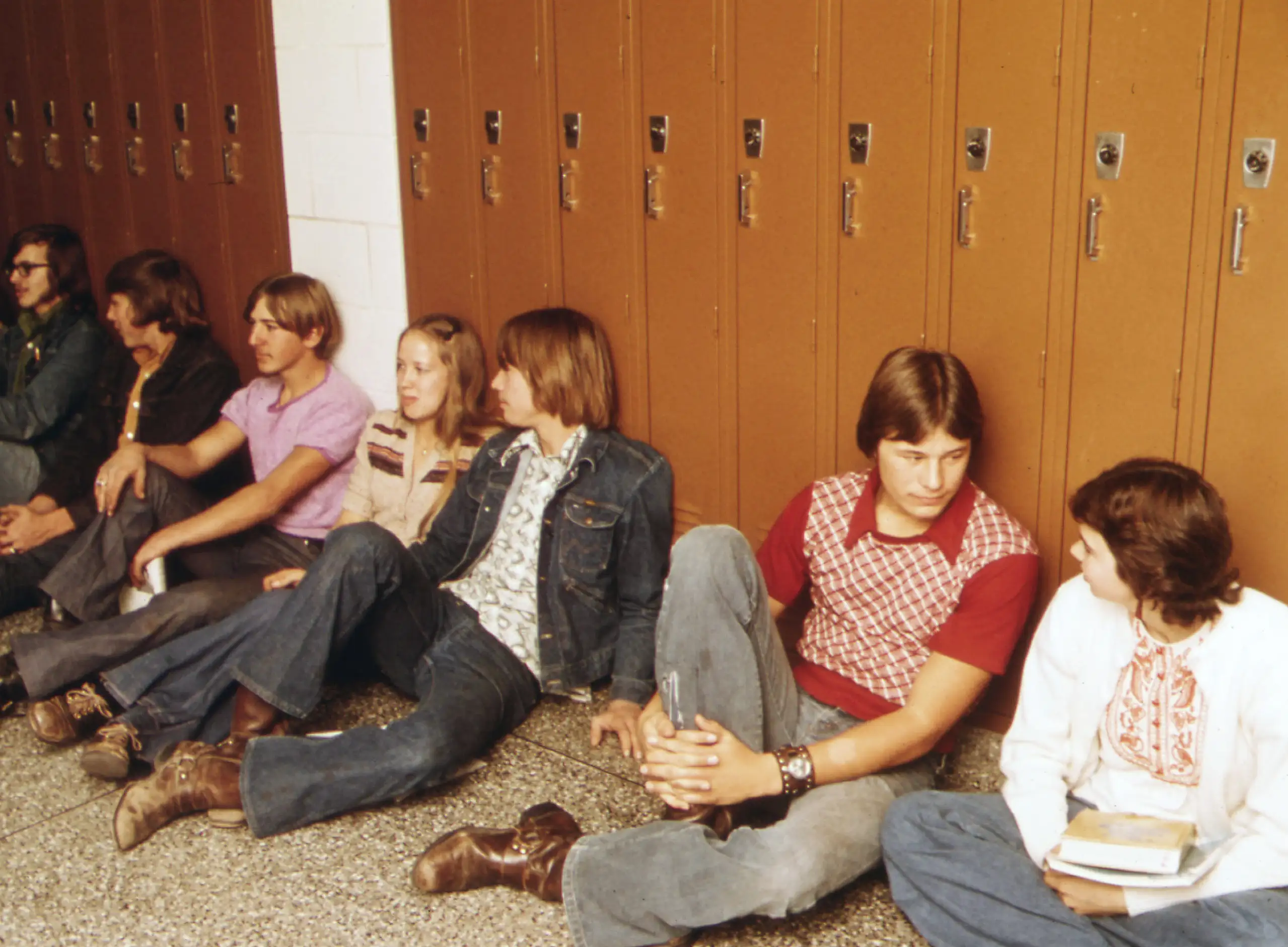
How to be less of an ‘unc’ and more of a ‘sigma’ this Christmas: Your guide to translating your teenager

Teenagers are our best linguistic innovators, but sometimes it can be hard to understand what they’re talking about
Published 24 December 2024
Have you ever felt as though your teenage offspring are speaking a foreign language?
Perhaps they’re ‘looksmaxxing’ while getting ready for their Christmas party, going all in on ‘Barbiecore or tenniscore', or calling you ‘bro’ when you’re pretty sure you’re not their brother.

It’s tempting to be a pedant and tell them they need to put a dollar in a jar every time they say ‘like’, in the hope you may stop the winds of language change.
But the reality is that languages are changing, all the time and before our very eyes.
And teenagers are our best linguistic innovators.
As sociolinguists, we study how and why languages change over time, and why these changes reflect important developments in society, culture and identity.
A compelling question for linguists is which linguistic innovations will stick around, and which ones will simply be a fad.
Consider adjectives that defined the 70s, like ‘radical’ or ‘groovy’, which are by now pretty uncool (unless used ironically). On that matter, the word ‘cool’ has persisted and become one of the most productive adjectives in English.

In the 1970s, the word ‘like’ started to be used in new ways.
For a long time, we’ve had ‘like’ as a verb (I like cake, or I like Christmas). But the ability to use ‘like’ as a filler word or as a way of marking focus, emphasis or approximation (what linguists would call a discourse marker) emerged as a linguistic innovation.
Look at these lyrics from the Frank Zappa song Valley Girl (1982):
“I, like, love going into, like, clothing stores and stuff
I, like, buy the neatest mini-skirts and stuff
It's, like, so bitchin'.”
At the time, the discourse marker ‘like’ emerged as a symbol of youth identity, and started to be used across the English-speaking world in what some sociolinguists have termed a black swan event: a highly unprecedented and rapidly spreading linguistic innovation.
It now occupies a firm place in our grammar, even if some pedants still love (like?) to hate it.

Some other recent innovations in English include the rise of ‘obviously’ as a marker of evidentiality and the rise of ‘really' as an amplifier.
The rate at which new words are spreading is likely due to the increasing consumption of short-form content like TikTok, although this remains to be empirically tested.
We do know that the high level of connectivity on these platforms provides the ability to share and proliferate new words more quickly and across cultures (consider the large proportion of slang from African American English that’s now used by Australian teenagers), although these kinds of words may also be displaced by new ones more quickly.
So what words are currently on the rise among English-speaking teenagers? Which ones will stick around, and which ones do you need to know to survive your Christmas lunch without needing subtitles?

Arts & Culture
‘Like’ has totally evolved to become, like, a legit word
For maximum authenticity, the guide below has been compiled with linguistic consultants currently attending high school and university:
Ate: ‘She ate’, or simply ‘ate that’, can be used to describe someone’s success or impressive performance. This has an interesting parallel with ‘cooked' which can mean having succeeded at something, as in the phrase ‘someone cooked here’, but which can also mean being doomed or done for.
Brain rot: Oxford English Dictionary’s Word of the Year in 2024, can be used both to describe inane or absurd online content or the consequences of consuming it. It was famously used in Fatima Payman’s ‘Gen Z’ speech to the Senate. You might hear “my sibling is scrolling on TikTok while decorating the Christmas tree. Clearly, they have brain rot”.
Bro is ___: This is a way of addressing anyone, not just a man or your brother. It emerged from memes where a bizarre action is captioned with ‘what is bro doing’. The construction is used to directly address someone, in place of the pronoun ‘you’. It often facetiously states the obvious – so you might hear “bro is ready for Christmas”.

Bussing or bussin’: This has a number of meanings but is most commonly used by Gen Zs as an adjective meaning delicious or excellent, originating from the phrase ‘bursting (with flavour)’ or ‘busting (a dance move)’. If this is used to describe your Christmas lunch, you can rest assured it’s a good thing.
Cap: Lies or untruths, particularly without good purpose. You can say “that’s so cap”, “stop capping” or “stop the cap” – equally “no cap” confirms that you’re telling the truth (like about Santa).
-core: Here we have a productive suffix (one that can be combined with other words to generate new words) to describe a ‘vibe’ or aesthetic – think ‘cottagecore’ or ‘Christmascore’. Forgetting what day of the week it is or your third helping of Pavlova is so ‘holidaycore’.

-maxxing: Another productive suffix used to enhance or improve subject matter, like ‘friendshipmaxxing’ or ‘Christmasmaxxing’. Its origins lie in the term ‘looksmaxxing’, meaning to maximise one’s physical appearance, generally to attract romantic attention.
Ohio: Originally from the phrase “only in Ohio” it refers to bizarre, strange or stupid things. Sadly, your Christmas tree could be described as ‘Ohio’ by some cynical adolescents. Some of our sources tell us this word has moved on and become the groovy of 2024 in that it’s only used ironically. It’s hard to keep up.
Rizz: Oxford English Dictionary’s Word of the Year in 2023, defined as someone’s charisma, charm or attractiveness, particularly towards potential romantic partners. Someone can have ‘excellent rizz’ or ‘no rizz’.

Sigma: A pseudoword used in relation to the descriptors ‘alpha’ or ‘beta’. It can describe an independent, self-reliant, aspirational person. It has also evolved into a meta-slang usage denoting an ironic display of shock – ‘what the sigma’ – which can be used to intentionally confuse people of an older generation, much like ‘skibidi’, popularised by the absurdist YouTube series Skibidi Toilet. Now, the word’s meaning is wholly contextually dependent, with ‘that’s so skibidi,’ for example, potentially meaning something that is extremely good or bad.
Slay: Similar to “ate” (see above) – something that is great, succeeds or excels, likely related to its synonym “killing/killed it”. This one is quite flexible: someone’s appearance can be slay, or you can slay a task. Popularised in queer culture, particularly drag spaces. As with most words, its meaning continues to evolve.

Sciences & Technology
Banning kids from social media? There’s a better way
Unc: Originally used in African American English to refer to an older male relative or an older man in a community, it has come to be used to designate older people, particularly those who would not understand current youth culture (or ‘brain rot’). These people could also be referred to as having ‘unc status’.
We hope this teen translation tool helps you these holidays – and here’s hoping you slay (sleigh?) your Christmascore decorations and you’re looking forward to 2025maxxing.
